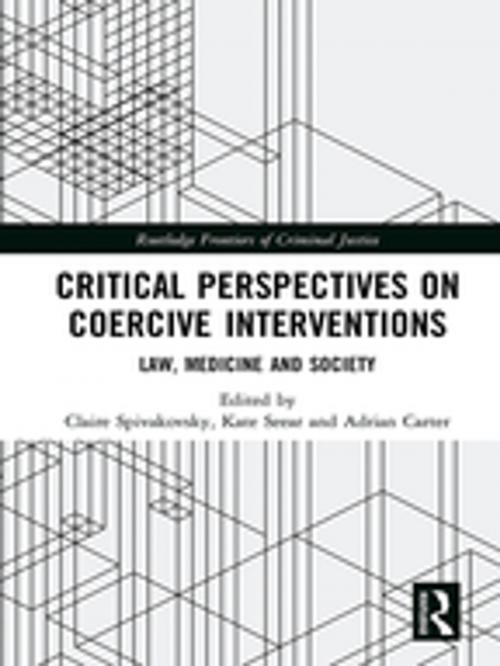Critical Perspectives on Coercive Interventions
Law, Medicine and Society
Nonfiction, Reference & Language, Law, Mental Health, Health, Health & Well Being, Psychology, Forensic Psychology| Author: | ISBN: | 9781351657334 | |
| Publisher: | Taylor and Francis | Publication: | May 11, 2018 |
| Imprint: | Routledge | Language: | English |
| Author: | |
| ISBN: | 9781351657334 |
| Publisher: | Taylor and Francis |
| Publication: | May 11, 2018 |
| Imprint: | Routledge |
| Language: | English |
Coercive medico-legal interventions are often employed to prevent people deemed to be unable to make competent decisions about their health, such as minors, people with mental illness, disability or problematic alcohol or other drug use, from harming themselves or others. These interventions can entail major curtailments of individuals’ liberty and bodily integrity, and may cause significant harm and distress. The use of coercive medico-legal interventions can also serve competing social interests that raise profound ethical, legal and clinical questions.
Examining the ethical, social and legal issues involved in coerced care, this book brings together the views and insights of leading researchers from a range of disciplines, including criminology, law, ethics, psychology and public health, as well as legal and medical practitioners, social-service ‘consumers’ and government officials. Topics addressed in this volume include: compulsory treatment and involuntary detention orders in civil mental health and disability law; mandatory alcohol and drug treatment programs and drug courts; community treatment orders; the use of welfare cards with Indigenous populations; mandated treatment of seriously ill minors; as well as adult guardianship and substituted decision-making regimes. These contributions attempt to shed light on why we use coercive interventions, whether we should, whether they are effective in achieving the benefits that are offered to justify their use, and the impact that they have on some of society’s most vulnerable citizens in the names of ‘justice’ and ‘treatment’.
This book is essential reading for clinicians, researchers and legal practitioners involved in the study and application of coerced care, as well as students and scholars in the fields of law, medicine, ethics and criminology. The collection asks important questions about the increasing use of coercive care that demand to be answered, and offers critical insights, guidance and recommendations for those working in the field.
Coercive medico-legal interventions are often employed to prevent people deemed to be unable to make competent decisions about their health, such as minors, people with mental illness, disability or problematic alcohol or other drug use, from harming themselves or others. These interventions can entail major curtailments of individuals’ liberty and bodily integrity, and may cause significant harm and distress. The use of coercive medico-legal interventions can also serve competing social interests that raise profound ethical, legal and clinical questions.
Examining the ethical, social and legal issues involved in coerced care, this book brings together the views and insights of leading researchers from a range of disciplines, including criminology, law, ethics, psychology and public health, as well as legal and medical practitioners, social-service ‘consumers’ and government officials. Topics addressed in this volume include: compulsory treatment and involuntary detention orders in civil mental health and disability law; mandatory alcohol and drug treatment programs and drug courts; community treatment orders; the use of welfare cards with Indigenous populations; mandated treatment of seriously ill minors; as well as adult guardianship and substituted decision-making regimes. These contributions attempt to shed light on why we use coercive interventions, whether we should, whether they are effective in achieving the benefits that are offered to justify their use, and the impact that they have on some of society’s most vulnerable citizens in the names of ‘justice’ and ‘treatment’.
This book is essential reading for clinicians, researchers and legal practitioners involved in the study and application of coerced care, as well as students and scholars in the fields of law, medicine, ethics and criminology. The collection asks important questions about the increasing use of coercive care that demand to be answered, and offers critical insights, guidance and recommendations for those working in the field.















